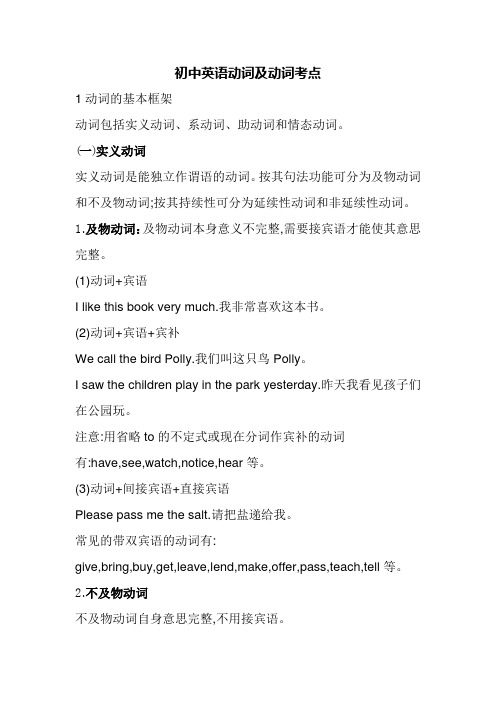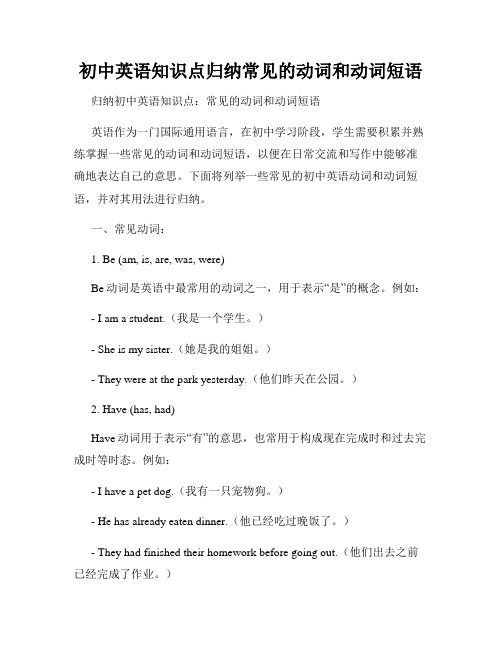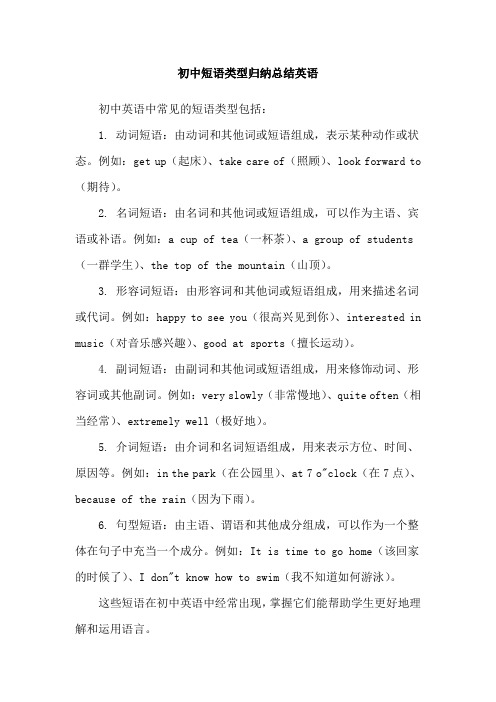[精品]初中英语动词和动词短语归纳
动词及动词短语(88张PPT)初中英语专项复习课件

进入。故选C。
( A )2. — Would you please ______ your email address? I missed it just now. — No problem. It's fox@163com. A. repeat B. review C. record 【解析】 考查动词辨析。句意:——你可以再重复一下你的电子邮箱吗?我刚刚忘记了。——没问题 。是fox@163com。repeat重复;review复习;record记录。故选A。
动词的基本形式 1. 动词原形 2. 一般现在时的第三人称单数的变化规则
一般情况下直接加-s
read — reads write — writes
run — runs
以 ch, sh, s, x 或 o 结尾的词 加-es
以“辅音字母+y”结尾的 词变 y 为 i 再加-es, 但以 “元音字母+y”结尾的词 则直接加-s
The film has been on for
不 能 和 表 示 一 finish, arrive,
动词
ten minutes. 电 影 开 始 十
段 时 间 的 状 语 join,
go,
分钟了。(这里不能用 has
连用
come, catch
begun)
2.助动词 助动词本身没有意义或意义不完整,不能单独用作谓语。助动词在句中与实义动词或系动词一起构成谓 语,以表示时态、语态、人称和数。此外,还可以用来构成否定句、疑问句或强调句等句型。具体用法 见下表。
lie — lying tie — tying
初中阶段常见的需要双写最后一个辅音字母变动词ing形式的动词有: shop, stop, drop, run, get, sit, dig, put, begin, swim, chat, prefer等。 【闪记】 现在分词构成歌诀
初中英语动词及动词短语考点

初中英语动词及动词考点1动词的基本框架动词包括实义动词、系动词、助动词和情态动词。
(一)实义动词实义动词是能独立作谓语的动词。
按其句法功能可分为及物动词和不及物动词;按其持续性可分为延续性动词和非延续性动词。
1.及物动词:及物动词本身意义不完整,需要接宾语才能使其意思完整。
(1)动词+宾语I like this book very much.我非常喜欢这本书。
(2)动词+宾语+宾补We call the bird Polly.我们叫这只鸟Polly。
I saw the children play in the park yesterday.昨天我看见孩子们在公园玩。
注意:用省略to的不定式或现在分词作宾补的动词有:have,see,watch,notice,hear等。
(3)动词+间接宾语+直接宾语Please pass me the salt.请把盐递给我。
常见的带双宾语的动词有:give,bring,buy,get,leave,lend,make,offer,pass,teach,tell等。
2.不及物动词不及物动词自身意思完整,不用接宾语。
Horses run fast.马跑得快。
(1)有些动词既可作及物动词又可作不及物动词。
We study English.我们学习英语。
(及物动词)We study hard.我们努力学习。
(不及物动词)(2)有些不及物动词与一些别的词搭配在一起构成动词短语,它的作用相当于一个及物动词。
①动词+介词Listen to the teacher carefully.仔细听老师讲。
此类动词短语后面的宾语无论是名词还是代词,都只能放在介词后面,不能放在动词和介词之间。
②动词+副词+介词Let’s go on with our work!让我们继续我们的工作吧!He gets along well with his classmates.他与他的同学们相处得很好。
初中英语知识点归纳常见的动词和动词短语

初中英语知识点归纳常见的动词和动词短语归纳初中英语知识点:常见的动词和动词短语英语作为一门国际通用语言,在初中学习阶段,学生需要积累并熟练掌握一些常见的动词和动词短语,以便在日常交流和写作中能够准确地表达自己的意思。
下面将列举一些常见的初中英语动词和动词短语,并对其用法进行归纳。
一、常见动词:1. Be (am, is, are, was, were)Be动词是英语中最常用的动词之一,用于表示“是”的概念。
例如:- I am a student.(我是一个学生。
)- She is my sister.(她是我的姐姐。
)- They were at the park yesterday.(他们昨天在公园。
)2. Have (has, had)Have动词用于表示“有”的意思,也常用于构成现在完成时和过去完成时等时态。
例如:- I have a pet dog.(我有一只宠物狗。
)- He has already eaten dinner.(他已经吃过晚饭了。
)- They had finished their homework before going out.(他们出去之前已经完成了作业。
)3. Do (does, did)Do动词常用于构成否定句、疑问句和一般疑问句等句子结构中。
例如:- I don't like coffee.(我不喜欢咖啡。
)- Does she play the piano?(她会弹钢琴吗?)- Did you go to the park yesterday?(你昨天去了公园吗?)4. Go (goes, went, gone)Go动词表示“去”的动作,也常用于构成进行时态和完成时态等句子。
例如:- I go to school by bus.(我坐公交车去上学。
)- She often goes swimming on weekends.(她经常在周末去游泳。
初中英语语法大全——动词和动词短语

初中英语语法大全——动词和动词短语动词说来描述主语的动作行为或状态的词。
动词,在句子中作谓语是句子不可缺少的部分,用来说明主语是什么、出于什么状态或做什么。
英语中的动词有不同的形式,这些形式体现出动作发生的时间、主语发出主动动作还是被动接受动作和说话者的语气,情感等。
一. 动词的种类根据不同的分类方式,动词可分为不同的类型。
根据动词的句法功能可以将动词分为实意动词,联系动词,助动词和情态动词。
①1. 实义动词实义动词具有完整意义,可以单独做谓语的动词,主要表示主语的动作,状态和品质。
实意动词。
也可与助动词相结合,表示更加复杂的动词意义。
实义动词主要包括及物动词和不及物动词。
(1) 能直接跟宾语的动词称为及物动词。
英语中的动词大多数都是及物动词。
及物动词可分为跟单宾语的及物动词、跟双宾语的及物动词和跟复合宾语的及物动词等。
A. 跟单宾语的及物动词If you want to change the world, you have to change yourself first.In April, the weather in some places in Shanxi was really changeable. People still remember they have experienced four seasons in a week.B. 跟双宾语的及物动词He gave me some books yesterday.A friend let some money to me.Mary bought a dictionary for me as a birthday present.C. 跟复合宾语的及物动词有些动词只跟一个宾语不完整,宾语后必须再加上宾语补足语来补充说明性质,状态等。
宾语补足语可以是形容词,名词,不定式,现在分词,过去分词副词或介词等。
Our English teacher often makes his story interesting.We consider him an honest boy.The doctor advised me to have a good rest.Can you hear someone playing the piano next door?(2)不及物动词本身意义完整,后面不需要跟宾语的动词称为不及物动词。
初中英语常用动词词组及短语

1.由 be 组成的(1) be back/in/out 回来 / 在家 / 出门(2) be at home/work 在家 / 上班(3)be good at 擅长,擅于(4)be carefulof 当心,注意,仔(5)be covered with 被⋯⋯复盖(6)be ready for ⋯⋯作好准(7)be surprised(at) ⋯⋯感觉惊(8) be interested in ⋯⋯感觉趣(9)be born 出生(10)be on 在行,在演出,(灯)亮着(11)be able to do sth. 能做⋯⋯(12)be afraid of (to do sth.that ⋯) 惧怕⋯⋯ ( 不敢做⋯⋯,唯恐⋯⋯ )(13)be angry with sb.生(某人)的气(14)be pleased (with) ⋯⋯感觉高(意)人 ) 格要求(17)be from 来自⋯⋯,什么地方人(18)be hungry/thirsty/tired了/渴了/ 累了(19)be worried 担(20)be (well)worth doing( 特别 )得做⋯⋯(21)be covered with 被⋯⋯所覆盖⋯⋯(22)be in (great)need of( 很 )需要(23)be in trouble 于窘境中(24)be glad to do sth. 很高做⋯⋯(25)be late for ⋯⋯到(26)be made of (from) 由⋯⋯制成(27)be satisfied with ⋯⋯感觉意(28)be free 空的,有空(15) be famous(29) be (ill) in bed 卧病在床for 以⋯⋯而有名(16) be strict(30) be busy doing (with) 忙于in (with)( 工作、做⋯⋯ ( 忙于⋯⋯ )2.由 come、do、get 、give 、go、have、help 、keep、make、look 、put 、set 、 send、take 、turn 、 play 等组成的(1) come back 回来(6) come out of 从⋯⋯出来(2) come down 下来(7) come up 上来(3) come in 入,来(8) come from 来自⋯⋯(4) come on 快,走吧,跟我来(9) do one's lessons/homework 做功 /(5) come out 出来回家作(10) do more speaking/reading 多做(32) give lessons to 给上课口头练习 / 朗诵(33) give in 折服(11) do one's best 全力(34) give up 放弃(12) do some shopping (cooking/re(35) give sb. a chance 给一次ading/cleaning) 买东西 ( 做饭菜,读点时机书,大打扫 )(13) do a good deed (good deeds) (36) give a message to 给一个口信做一件好事 ( 做好事 )(14) do morning exercises 做晨操(37) go ahead 先走,向前走,去吧,干吧(15) do eye exercises 做眼保健操(38) go to the cinema 看电影(16) do well in 在某方面干得好(39) go to bed 睡觉(17) get up 起床(40) go to school (college) 上学(18) get everything ready 把全部都(上大学)准备好(41) go to (the) hospital 去医院看(19) get ready for (=be ready f 病or) 为作好准备(42) go over 过一遍,复习(20) get on (well) with 与相处(43) go over to 朝走去( 和睦)(21) get back 返回(44) go fishing/skating/swimming/shopping 去垂钓 / 溜冰 / 游泳 / 买东西(22) get rid of 除去,去除(45) go home (there) 回家去 ( 去那边 ) (23) get in 进入,采集(46) go round 趁便去,绕道走(24) get on/off 上/ 下车(47) go up 上去(25) get to 抵达(48) go out for a walk 出门漫步(26) get there 抵达那边(49) go on (doing) 持续( 做 ) (27) give sb. a call 给打电话(50) go shopping 去购物(28) give a talk 作报告(51) go on with one's work 持续某(29) give a lecture (a piano co 人的工作ncert) 作讲座 ( 举行钢琴音乐会 )(52) go upstairs/downstairs 上/ 下楼(30) give back 送还,送回(53) (the lights) go out( 灯) 熄了(31) givesome advice on 给(54) have a lesson (lessons)/am一些忠告eeting 上课 / 开会(74) have something done 让人 ( 请人 ) (55) have a football match (bask做etball match) 举行一场足球 ( 篮球 ) 赛(75) have a test/an exam测试 / 考试(56) have dictation 听见(76) have an idea 有了个想法(57) have a try 试一试(77) had better do sth. (not do(58) have a good/wonderful time 玩sth.) 最好做 ( 最好不要做 ) 得很快乐(78) have a word with 与谈几句(59) have a lecture (a piano co话ncert) 听讲座 ( 听钢琴音乐会 ) (79) help sb. with sth. 在方面(60) have a report (talk) on 听一帮助个对于的报告(80) help sb. (to) do sth. 帮(61) have a glass of water (a助做cup of tea) 喝一杯水, ( 一杯茶 ) (81) help oneself to some chicken/fish/meat 请随意吃点鸡 / 鱼/ 肉(62)have breakfast/lunch/supper/dinner 吃早餐 / 午餐 / 晚餐(82) help each other 相互帮助(63) have a meal (three meals) 吃(83) have nothing to do 无事可做一顿饭 ( 三餐饭 )(84) keep up with 跟上,不落伍(64) have bread and milk for br 于eakfast 早餐吃面包和牛奶(85) keep silent/quiet 保持缄默 / 寂静(65) have (have got) a headache(86) keep sb. doing sth. 使一头痛直做(66) have a fever 发热(87) keep one's diary 记日志(67) have a cough (a cold) 咳嗽(88) make a noise (a lot of no( 感冒)ise/much noise(68) have a look (at) 看一看(89) make a living 糊口(69) have a rest (a break) 歇息一(90) make the bed 整理床铺会儿 ( 工间或课间歇息 )(70) have a talk 讲话(91) make sb. do sth. 迫使某人做(71) have a swim/walk 游泳/ 漫步(92) make faces (a face) 做鬼脸(72) have sports 进行体育锻炼(93) make friends (with) 与交朋(73) have a sports meet (meeting) 友开运动会(94)make a mistake (mistakes) 犯错误(95)make room/space for 给腾出地方(96)make a sentence (sentences)w ith用造句(97)make a fire 生火(98)be made from/of 由制成(99)be made in 在地方制造(100) look out of (outside)往外看(看外面)(101)look up a word (in the di ctionary) 查词典(102) look up 往上看,仰望(103)look after 照料,照看,照顾(104)look for 找寻(105)look like 看上去像(106) look fine/well/tired/worried看起来气色好 / 健康 / 疲惫 / 忧愁(107)look out 当心,当心(108)look on as把看作对待(109)look around 朝周围看(110)look at 看着(111) put on 穿上 ( 衣服 ) ,戴上 ( 帽子 ) ,(131) take it easy 别紧张(132) take sth. with sb. 随身带着(133) take sb. to a park/London for one's holidays 带某人去公园 /伦敦度假(134) take care of 关怀,照顾,保存演出( 戏剧 )(112)put up 建筑,搭起,挂起,举起,张贴(113)put into 使进入,输入(114) put one's heart into 聚精会神于(115)put down把放下(116)put into 把译成(117) set up 竖起,建起(118)set off 出发,起程(119)set out 出发(120)set an example for 为建立楷模(121)send for 派人去请 ( 叫)(122)send out 放出,发出(123)end up 把往上送,发射(124)take one's advice 遵从某人劝说(125)take out 取出,取出(126)take down拿下(127)take place 发生(128)take one's place 坐的座位,取代某人职务(129)take the place of 取代(130) take a walk/rest 漫步/歇息(135) take a look (a last look) at 看一看 ( 最后看一眼 )(136)take an exam参加考试(137)take away拿走(138) take back 回收,带回(139) take hold of 抓住(148) turn into 变为(140) take off 脱下 ( 衣,帽,鞋等 ) 拿掉(149) turn to 翻到,转向(141) take (an active)part in( 积(150) turn down(把音量 ) 调低极)参加(活动)(151) turn over 把翻过来(142) take photos 摄影(152) play basketball/ football/v (143) take some medicine 服药olleyball 打篮球 / 踢足球 / 打排球(144) take a bus/train/boat (153) play games做游戏(145) turn on 开,旋开 ( 电灯,收音机(154) play the piano (the violin) 等) 弹钢琴 ( 拉小提琴 ) (146) turn off 关上 ( 电灯,收音机等 ) (155) play with snow玩雪(147) turn in 交出,上交(156) play a joke (on) 对开玩笑3.由其余动词组成的词组(1) think over 认真考虑(10) hold a meeting 举行会议(2) arrive at/in a place 抵达某处(11) hold up 举起(3) eat up 吃完,吃光(12) hurry up 赶忙,快点(4) do well in 在干得好(13) enter for 报名参加(5) enjoy doing sth. like doing s (14) laugh at 嘲讽th. 喜爱做某事喜爱干某事(15) be used to 习惯于(6) find out 发现,查出 ( 实情等 )(16) used to 过去经常(7) finish off 吃完,喝完(17) wake up 唤醒(8) stop doing sth. 停止做某事(18) work out 算出(9) stop to do sth. 停下往来做某事4.动词短语(1) ask for 向要,恳求(7) apologize to sb. for sth. 为某事向某人致歉(2) ask for leave 告假(8) look for 找寻(3) send for 派人去请 ( 叫)(9) leave for走开去(4) pay for 付的款(10)fall off 跌落(5) wait for 等待(11)catch cold 着凉,伤风(6) thank for 为感谢(12)catch up with 追上(38)stay in bed 卧病在床(13)agree with sb. 成,赞同某人的意(14)be filled ⋯⋯ with 把⋯⋯装(15)tell sb. about sth. 告某人某事(16)talk about ⋯⋯(17)think about 考⋯⋯(18)worry about 担⋯⋯(19)look after 照顾(20)run after 追赶,跟在后边跑(21)read after 跟⋯⋯(22)smile at ⋯⋯浅笑(23)knock at 敲( 、窗 )(24)shout at ⋯⋯大叫 ( 嚷)(25)throw away 抛弃(26)work hard at 努力做⋯⋯(27)wait in line 排等待(28)change⋯ into ⋯成(29)hurry into ⋯仓促入(30)hurry up 快点(31)run into ⋯跑(32)hear of 听(33)hear from 收到⋯⋯来信(34)think of ,考(35)catch hold of 抓住(36)instead of 取代⋯⋯(37)hand in 交上来。
初中英语动词和动词短语固定搭配

初中英语动词和动词短语固定搭配& prefer to do rather than do (宁愿……而不喜欢)= would rather do than do& make oneself done 使某人被……I couldn’t make myself understood/heard/seen…& have sth. done 请,让某人做什么I have my hair cut. I had my bike repaired yesterday. & please don’t sth. 对比would/could/ you please〕(not)do sth.Please don’t spit in public! =Would you please not spit in public!专门练习:A组:考查_________________ 知识1.That old man enjoys (讲)stories to children.2.He stayed in England for two years, but he isn’t good at 说English.3.I don’t feel like 吃anything.4. Would you mind ______(close) the window=(Would you mind my (me)closing the window)5. When she heard the news. She couldn’t help _______(cry)6. You have worked for a long time. What about _________(have) a rest.7. He does well in English. He practices_________(speak) English every day.8. He is busy________(do) his homework, Turn down the TV.9. He used to get up late, but now he is used to ______(get)up early.10. The book is well worth ________(read).11. He’s considering_________(go) abroad.B组:考查_________________ 知识1. It’s necessary (take)medicine on time.2.I t’s not easy so much homework in one day.A. for him to doB. of him to doC. for him doing3. It’s you to catch the thief.A. bad forB. nice ofC. easy of4. It’s very cold outside. Please tell the boy the coat.A. not to take offB. take offC. don’t put onD. not take off5. We were poor then we had no room .A. to liveB. living inC. to live inD. to stay6. I can’t drive the car, can you show me first.A. what to doB. how to doC. where to goD. what do I do7.There is a room (居住)8.He is n’t rich, he can’t afford _______(buy) the car.9. Our teacher asked us __________(not swim) in the river.10. It is not allowed __________(swim) in the river.11. ---Let’s go for a picnic! --- Sorry, I have a lot of homework______(do)C组:考查_________________ 知识1.Tom wanted to make his brother (哭),but this time he is made_______(哭)by his brother.2.Finish your homework first, or I won’t let you . A. to go out B. go out C. going out3.It’s too noisy. You’d better the radio or others will be unhappy.A.to turn downB. turn onC. turn down4.I’m very tired today. –Why a rest . A. don’t take B. not to take C. not take5. You had better __________here.A. not smokeB. don’t smokeC. not to smoke6. He dare not ________(speak) English in public.7. You needn’t ________(worry) about the final exam.8. Could you please______(open) the window.9. Would you please_______(help) me.10.* He preferred______ (stay) at home rather than______ (go) out.*He would_______(stay) at home than______(go)outC组:考查_________________ 知识1.When you leave the room, remember________(turn) off the lights.2.I remembered ______(turn)off the lights when I left the room.3.It’s cold outside, don’t forget ________(put)on the coat.4.After doing the housework, she went on __________(do)her homework.5.After two-hour walk, he stopped __________(have) a rest.6.She likes__________(read),but he doesn’t like________(read)now.7.Listen! Can you hear her ________(sing) in the room.8.We can see bees and butterflies _______(dance) among the flowers9.I often find him_______(copy)homework from others.10. When our teacher came in, we all stopped_______(talk).11.He can’t help _______ (clean)the house because she’s busy making a cake.。
初中英语知识点归纳常见动词短语和固定搭配

初中英语知识点归纳常见动词短语和固定搭配动词短语和固定搭配在英语学习中是非常重要的一部分。
它们能够帮助我们更准确地表达自己的意思,使我们的英语更加地地道和自然。
在初中英语学习中,我们经常会遇到一些常见的动词短语和固定搭配,下面将对其中的一些进行归纳总结。
一、常见动词短语1. Look after:照顾例句:My sister is looking after my pet dog while I am on vacation.2. Take care of:照顾例句:I need to take care of my younger brother when my parents arenot at home.3. Get up:起床例句:I usually get up early in the morning to prepare for school.4. Wake up:醒来例句:She woke up late and missed the bus to school.5. Go on:继续例句:After a short break, the teacher asked the students to go on with their presentation.6. Carry on:继续例句:We should carry on learning even when facing difficulties.7. Put on:穿上例句:She put on her favorite dress for the party.8. Take off:脱下例句:He took off his hat as a sign of respect.9. Pick up:拾起例句:Please pick up the toys and put them in the toy box.10. Turn on:打开例句:I turned on the TV to watch my favorite show.二、常见固定搭配1. Make a decision:做出决定例句:It is not easy for me to make a decision about which college to attend.2. Take a break:休息一下例句:Let's take a break and have a cup of tea.3. Have a good time:玩得开心例句:We had a good time at the amusement park yesterday.4. Give up:放弃例句:Don't give up when facing challenges. Keep trying!5. Get along with:与……相处例句:I get along very well with my classmates.6. Look forward to:期待例句:I am looking forward to the summer vacation.7. Catch up with:赶上例句:I need to study harder to catch up with my classmates.8. Put off:推迟例句:The meeting has been put off until next week.9. Make progress:取得进步例句:She has made great progress in learning English.10. Keep in touch:保持联系例句:Although they live in different cities now, they still keep in touch with each other.以上是初中英语知识点归纳常见动词短语和固定搭配的内容。
初中短语类型归纳总结英语

初中短语类型归纳总结英语
初中英语中常见的短语类型包括:
1. 动词短语:由动词和其他词或短语组成,表示某种动作或状态。
例如:get up(起床)、take care of(照顾)、look forward to (期待)。
2. 名词短语:由名词和其他词或短语组成,可以作为主语、宾语或补语。
例如:a cup of tea(一杯茶)、a group of students (一群学生)、the top of the mountain(山顶)。
3. 形容词短语:由形容词和其他词或短语组成,用来描述名词或代词。
例如:happy to see you(很高兴见到你)、interested in music(对音乐感兴趣)、good at sports(擅长运动)。
4. 副词短语:由副词和其他词或短语组成,用来修饰动词、形容词或其他副词。
例如:very slowly(非常慢地)、quite often(相当经常)、extremely well(极好地)。
5. 介词短语:由介词和名词短语组成,用来表示方位、时间、原因等。
例如:in the park(在公园里)、at 7 o"clock(在7点)、because of the rain(因为下雨)。
6. 句型短语:由主语、谓语和其他成分组成,可以作为一个整体在句子中充当一个成分。
例如:It is time to go home(该回家的时候了)、I don"t know how to swim(我不知道如何游泳)。
这些短语在初中英语中经常出现,掌握它们能帮助学生更好地理解和运用语言。
